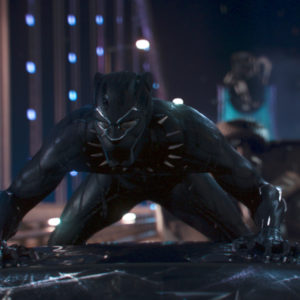Editor’s Note: For an alternative viewpoint, please see: Point: ‘Black Panther’ Exposes Immigrant Resentment in the Black Community
“Gone With the Wind,” regarded as one of the quintessential symbols of American film at its best, gave the world the equally quintessential symbol of Black stereotypes: Mammy. With her booming voice, wide girth and dark complexion accentuated by glistening beads of sweat from working (literally) like a slave, Mammy represents white America’s conceptualization of what black womanhood is (and ought to be).
To say that her life revolves around her charge, Scarlett O’Hara, is both figurative and literal. Mammy spends her life worrying about Scarlett, caring for Scarlett, and helping Scarlett. Pork, Gerald O’Hara’s valet, and Sam, the foreman at the O’Hara plantation, are just as irrelevant. Pork is loyal, but dim-witted and dependent. Sam is large and hulking with no other aspiration than to serve white folks. Existence for all three is tethered to the more developed white characters.
Almost 80 years later, Mammy has been transformed into the “magical Negro” and the “sassy black friend.” Modern Mammy offers the white protagonist unwavering encouragement and sage advice. Pork lives on in the black fool meant to provide comedic relief. Sam, still large and hulking, has evolved into an inherently criminal thug. Both function as human plot devices that allow the white protagonist to save the day.
An analysis of 160,000 credited roles from 26,000 “major” American films speaks to the stamina of the black thug trope. It discovered that black actors constituted 66 percent of actors credited for the role of “thug,” 62 percent of actors credited for the role of “gang member,” and 60 percent of actors credited for the role of “gangbanger.” Meanwhile, only 9 percent and 3 percent of actors credited with the more professional roles of “doctor” and “pilot,” respectively, were black.
“Black Panther” rejects these tropes, ushering in a new age of expression in which blackness is disconnected from and unburdened by whiteness. Gone are the days, the film insists, of black characters as one-dimensional and underdeveloped in order to make room for and advance the development of white characters.
T’Challa, the titular Black Panther, and his rival, Erik “Killmonger” Stevens are compelling on their own merits, exhibiting a range of emotions and dynamic development that emphasizes their individual humanity. Brave but untested, T’Challa uses his predecessors’ missteps to chart his own course as king of Wakanda, the fictional African nation in which the story is set, and the Black Panther.
Violent, resentful and highly intelligent, Killmonger has been hardened by the disenfranchisement he experienced as a young black man in the United States to complex results: He vows to use the resources of Wakanda to establish it as a world superpower that liberates the oppressed and that subjugates the oppressors.
“Black Panther” scoffs at stereotypical expectations foisted upon black womanhood by white hegemony. In Wakanda, black women are intellectuals like Shuri, who uses her brilliance to elevate Wakanda’s technological development to new heights. Black women are activists determined to improve the human condition like Nakia, who has been disturbed by the hardships she has witnessed elsewhere in the world. They are skilled warriors like Okoye and the other women of the Dora Milaje.
That “Black Panther” tells a story in which blackness is separate from whiteness is reflected even in its setting. One of the most radical features of the story is that Wakanda escaped the grip of European pillaging and colonization, instilling the nation with individualism of its own.
If anything, the plot devices in “Black Panther” are its two main, but very much minor, white characters, who, ironically, assume the tropes usually reserved for black characters.
Ulysses Klaue, a thug specializing in smuggling black-market weapons whose only aim is profit maximization, serves to edge the plot closer to the ultimate clash between the film’s central black characters: T’Challa and Killmonger. CIA agent Everett Ross provides comedic relief: His whiteness jokingly renders him a “colonizer.” His ineptitude is thrown into sharp contrast by the adeptness of the Wakandans whose lead he follows.
Especially in the age of Trump, witnessing the terms of a white man’s heroism get dictated by a young, more-able black woman is revolutionary. Here, whiteness is lent relevance only insofar as it is associated with blackness.
In a world still rife with characters like Mammy, Pork and Sam, “Black Panther” offers the realism of the black experience. It imbibes its black characters with the revolutionary concept at the heart of the global black community’s 400-year-old struggle with oppression: individuality.

